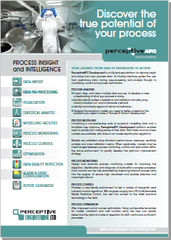Unlock Your Process
A one-box toolset containing everything you need to get the most from your plant. Designed and built by experts in process improvement, to tackle the challenges of increasing process capability, capacity and quality.

More than ever before, process engineers are responsible for continually improving the productivity of their plants. To do this, they need the skills and tools to evaluate opportunities and demonstrate tangible improvements in short time-frames.
PerceptiveAPC Development provides a comprehensive suite of statistical analysis techniques to benchmark and quantify improvement opportunities, alongside a powerful mix of control and monitoring technologies that can deliver real gains.
Having everything together in one place - to investigate, quantify, and evaluate multiple monitoring and control strategies - enables the engineer to rapidly find and prototype a solution ready for testing and approval. This is why Perceptive's Development software is used by the process improvement teams of leading global manufacturers, around the world.
PerceptiveAPC Development
Process Analysis
Imported data is analysed for outliers, correlations, and statistical normality using a broad range of univariate and multivariate statistical methods. The process dataset may be used to identify and classify regions of abnormal behaviour and develop appropriate models to gain a greater understanding of the problem.
Process Modelling
Process models are derived empirically using linear and non-linear regression techniques within the Modelling module, which also includes model path masking, sensitivity analysis and cross validation metrics to provide a complete modelling framework. Any process model may be interchanged between process monitoring, control and optimization within the same environment to enable efficient development of complete process improvement solutions.
Process Monitoring
The Process Monitoring module provides facilities to design and evaluate monitoring engines capable of improving process alarming, fault detection, fault identification, and fault diagnosis in complex processes. Each monitor can undergo thorough evaluation by data streaming historical process data into the engine; this ensures a high robustness level that ultimately provides effective and meaningful alarms.
Process Control
The fourth module offers a practical approach to process control engineering, within a user friendly environment to test the variety of frequently used industrial control algorithms. With engines ranging from PID to Multivariable Model Predictive Control, the user has access to the latest technology in the field.
Process Optimisation
Optimisation is the natural progression from improved control. The software's Optimisation module provides engines to calculate optimum solutions for continuous and batch processes using the process models derived within PerceptiveAPC Development. The user is provided with configurable templates for entries for optimisation constraints, cost functions and model entry to ease the procedure for quickly determining an optimum solution.